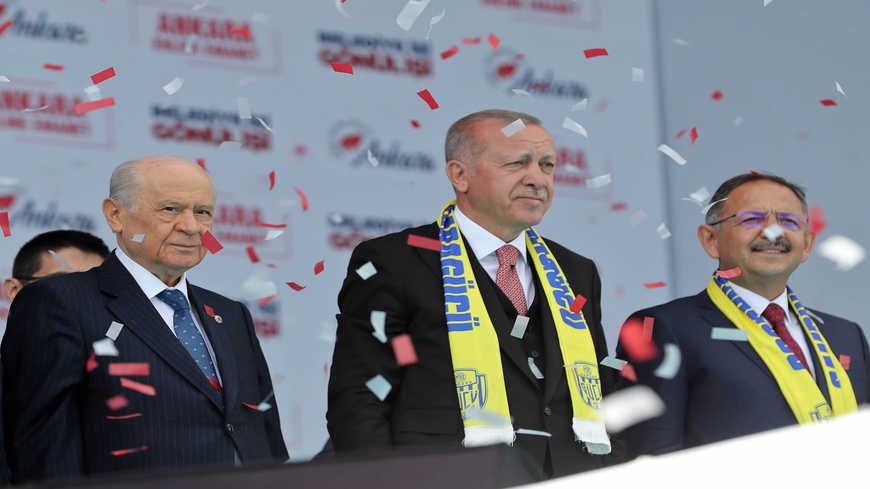Last week, after learning that Israel and the UAE were normalizing relations, Turkey’s firebrand president, Recep Tayyip Erdogan, threatened to recall his ambassador to the UAE and break off diplomatic relations for this “betrayal” of the Palestinians.
Erdogan has good reasons to be upset by the emerging Israel-UAE accord, but it has little to do with his concern for Palestinian rights and everything to do with Turkey’s crumbling ambitions for regional hegemony.
President Erdogan and his sycophants believe that Turkey’s rightful place is as a global power. Erdogan said as much in 2018 when he told his cheering supporters that he will focus his efforts on making Turkey a superpower.
This year, in a speech about the global crisis due to COVID-19, Erdogan declared that the West’s prosperity “based on the blood, tears, pain and exploitation of the rest of the world” is coming to an end. Similarly, last month Turkey’s Interior Minister, Suleyman Soylu, who was handpicked by Erdogan, said that Turkey will soon become the world’s center of attraction. – Advertisment –
Such words are matched by deeds. In 2017, Erdogan called for the revision of the Lausanne Treaty of 1923, which demarcated his country’s borders, indicating that he would like to see territorial rectifications with Greece. In 2019, Turkey’s interior minister Soylu commented that Northern Syria is actually part of the Turkish homeland in accordance with the 1920 National Pact, the territory claimed by the Turkish nationalist forces as they waged their war of independence a century ago.

Meanwhile, after several military interventions, Turkey, together with its proxy, the Syrian National Army, rule significant parts of northern Syria where Turkish officials oversee the running of area where, like a colony, Turkish goods, healthcare and education services are provided and even the Turkish lira is used for commercial transactions.
Similarly, Turkey exerts overwhelming influence over the Kurdistan Region of Iraq and Turkey continues to station tens of thousands of troops in Northern Cyprus while seeking to scupper the Republic of Cyprus efforts to extract offshore hydrocarbon. Also, in the Mediterranean, Turkey disputes Greece’s Exclusive Economic Zones (EEZ) and earlier this month went so far as to send a naval vessel to escort seismic research vessels exploring in waters that Greece claims.
Ankara signed a unilateral demarcation agreement that claims Greek EEZs with the embattled Tripoli government in Libya, which only exists thanks to Turkish military assistance and Turkish-sponsored Syrian auxiliaries, some of which are drawn from Jihadist militias. – Advertisment –
Meanwhile, Turkey established military bases in Qatar and Somalia, and potentially one on the Sudanese island of Suakin by the Red Sea and Horn of Africa, where Ankara, together with Qatar, compete for influence against the UAE and Saudi Arabia.
However, Ankara is now on the backfoot as political and economic developments have upset its plans for regional domination and states come together to ward off Turkish belligerency.
As Sudan undergoes political reform, Turkey’s plans for a military base on Suakin is off the table and Khartoum may even follow the UAE’s lead and normalize relations with Israel.

Turkey’s drilling in the East Mediterranean earlier this month prompted France to send a naval escort in solidarity with Greece and Cyprus, and all 27 of the EU’s foreign ministers expressed their full solidarity with the two EU member-states. Earlier in February, Brussels hit Turkey with sanctions and a pre-accession fund freeze worth millions of euros because of its activities off Cyprus. In January 2020, Italy, Israel, Egypt, Cyprus and Greece formed the Eastmed Gas Forum, and last month Greece and Egypt signed their own maritime agreement. – Advertisment –
Around the same time that the Israel-UAE deal was unveiled, Greece’s foreign minister meet his Israeli counterpart Gabi Ashkenazi and Israeli Prime Minister Benjamin Netanyahu. Just before, Jerusalem declared its solidarity with Greece. Then the UAE announced that it had sent four F-16 fighter jets to take part in a military exercise with Greece off of Crete scheduled for 25 August.
In the East Mediterranean, an anti-Turkish alliance backed by the EU and the Gulf states is forming.
Although a significant power with a strong military, Turkey has nowhere to turn for support. Ankara angered the West by seeking closer relations with Moscow, even risking U.S. sanctions to purchase Russia’s S400 missile defence system. However, in Syria, Moscow backs Turkey’s adversary, the Assad regime, and in Libya, Turkey and Russia are on opposite ends of the civil war.

What is more, in the face of continued pressure due to the COVID-19 crisis, Turkey’s economy, already struggling with a plummeting lira, a balance of payments deficit, high unemployment and declining growth, is expected to be the one of the hardest hit among the G20 economic powers, limiting Turkey’s economic resources for its international ambitions.
Even Turkey’s much heralded Black Sea gas discoveries cannot save Turkey’s woeful economic outlook, especially as it will take years and considerable investment before the gas becomes commercially viable.
Turkey’s only real ally is Qatar. But even Doha stayed largely silent about developments in the Mediterranean, especially as the state-owned Qatar Petroleum is part of the consortium with ExxonMobil to survey Hydrocarbon off Cyprus and plans to invest in Egypt’s gas refinery project.
But a cornered Turkey is a dangerous Turkey, and, as its 46-year occupation of Northern Cyprus shows, Ankara is willing to take significant economic hits and diplomatic losses, and even, in the words of Erdogan last month, to “sacrifice its entire being,” including lives, to become a regional superpower.
By: Simon A. Waldman
Dr Simon A. Waldman is an associate fellow at the Henry Jackson Society and a visiting research fellow at King’s College London. He is the co-author of “The New Turkey and Its Discontents” (Oxford University Press, 2017). Twitter: @simonwaldman1
Source: Haaretz



